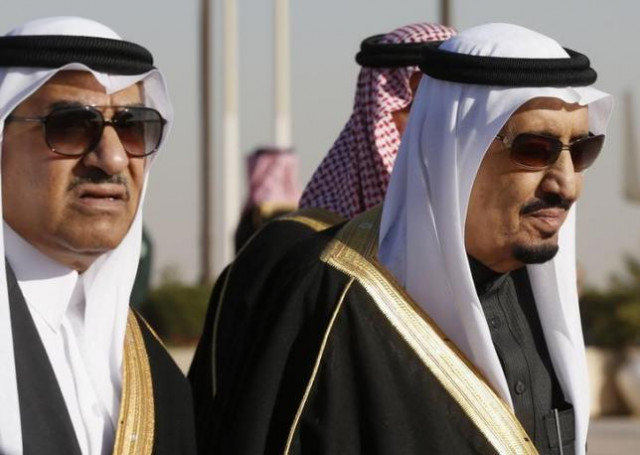Powerful Saudi royal heirs will define kingdom's future
Stability at the top have rarely been more important for Saudi Arabia as it attempts to navigate regional conflict

Crown Prince Mohammed bin Nayef, 56, with King Salman. PHOTO: REUTERS
Crown Prince Mohammed bin Nayef, 56, and Deputy Crown Prince Mohammed bin Salman, 30, are next in line to succeed 79-year-old King Salman in ruling the world's top oil exporter, as it faces regional turmoil and low crude oil prices.
People who have attended meetings between the two cousins describe their public interactions as cordial and respectful, but such accounts have done little to stem suspicions among some Saudis that this apparently amicable facade hides a more fractious relationship.
The elder prince, Mohammed bin Nayef, is a widely respected veteran of Saudi politics while the younger royal is a relatively inexperienced but favoured son of the king.
 Crown Prince Mohammed bin Nayef. PHOTO: AFP
Crown Prince Mohammed bin Nayef. PHOTO: AFPAlthough Saudis are well accustomed to factionalism among the Al Saud dynasty's hundreds of princes, several well-connected Saudis said the relationship between the two men was simply too sensitive a subject to discuss openly. However, some did acknowledge hearing about underlying friction but refused to be any more specific.
Last week, King Salman removed Saad al-Jabri, an aide of the crown prince, from his role as a minister of state, a move that was not officially explained, and led to speculation among Saudis and Gulf-based diplomats that it reflected wider tension within the ruling elite.
There was no official comment to explain his removal.
Harmony and stability at the top have rarely been more important for Saudi Arabia as it attempts to navigate regional conflict and the economic fallout from tumbling crude prices while managing leadership change.
Read: Saudi king shuffles government again
Since he took power in January, King Salman has overturned expectations of how the kingdom conducts its business, changing the line of succession, launching a military operation in Yemen and endorsing an oil strategy that has let prices fall.
That new approach appears to owe much to the two Prince Mohammeds, who between them now control most levers of power via a pair of government super-committees on security and the economy, while most other Al Saud members have been side-lined.
Observers heralded a departure from the previous era to more pro-active policies after years of paralysis, citing the power of the princes.
Dynastic politics
The prominence of the two Prince Mohammeds means that any moves at the top of the Saudi government, particularly any involving Al Saud members or close aides to either of Salman's named successors, will be closely watched.
The removal of Jabri, who even in 2006 was described by US diplomats in a Riyadh embassy cable later released by WikiLeaks as Mohammed bin Nayef's "go to" man on a range of issues and a key member of the prince's staff, was just such an event.
 Deputy Crown Prince Mohammed bin Salman. PHOTO: AFP
Deputy Crown Prince Mohammed bin Salman. PHOTO: AFPIf the crown prince's other key aide, Khalid al-Humaidan, who was made intelligence chief in January, were replaced, for instance, then speculation about friction at the top, and rumours about new changes in the line of succession, might grow.
Dynastic squabbling brought down a Saudi state in the 1880s. In the last century, King Saud's efforts to limit the line of succession to his own sons, cutting out brothers and nephews, contributed to the family forcing him from power in 1962, so such things are keenly watched.
Tension between the family's different wings are usually open secrets, talked about in private and denied in public, while the Al Saud present an appearance of unity, an approach that has sometimes backfired by letting speculation flourish.
Experience and youth
There were reassuring noises about the new power structure.
"I think it's a good working relationship. Necessity demands it, and Mohammed bin Nayef is a highly respected person and in this society there is a lot of deference to age," said Khaled al-Maeena, editor at large of the English-language daily Saudi Gazette.
Crown Prince Mohammed bin Nayef, who has also been interior minister since 2013, is close to Washington, crushed an al Qaeda uprising while running internal security a decade ago and barely escaped assassination by a jihadist suicide bomber in 2010.
As head of the security committee, he oversees most political issues, including anything relating to the kingdom's internal stability or regional position and its support for Syrian rebels.
When Salman placed him in the line of succession as deputy crown prince on assuming power in January, and then moved him up another notch in April, it was no real surprise given the interior minister's high profile and background in top jobs.
Deputy Crown Prince Mohammed bin Salman, by contrast, has enjoyed a dizzying rise since his father became king and promoted him from head of his personal court to defence minister and then second-in-line, bypassing scores of uncles and cousins.
He is in charge of a council tasked with addressing long-term economic development challenges, such as those posed by declining crude revenue, and theoretically oversees fiscal, energy, monetary and educational policies.
That clear division of responsibilities, the 25-year age gap between the two and Mohammed bin Nayef's lack of sons mean the pair would not necessarily be direct rivals for power because Mohammed bin Salman can count on a long run after his cousin.
A Saudi source, who declined to be named, said relations amongst the royals were good. "The great majority of the family is settled. The powerful princes are happy," the source said.




1726734110-0/BeFunky-collage-(10)1726734110-0-208x130.webp)














COMMENTS
Comments are moderated and generally will be posted if they are on-topic and not abusive.
For more information, please see our Comments FAQ